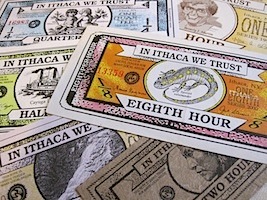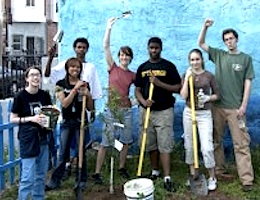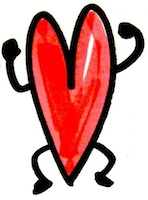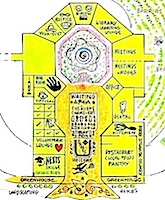






 |
 |
 |
 |
 |
  |
| PAUL
GLOVER ESSAYS: community
control of food, fuel, housing, health care,
planning, education, finance. |
| HOME | INTRO | CURRENCY | SUCCESSES | HOW-TO BOOK | PUBLICITY | ESSAYS |
|
Fresh
Cash by Paul Glover, Philadelphia Daily News 3/3/10
Philadelphia is rich enough to create thousands more jobs, revive public schools, fill swimming pools, staff our libraries, build more free clinics, clean our rivers, fix the pipes, feed the hungry and reduce crime. There's no budget problem. There's an imagination problem. Many of us imagine that nothing can happen without dollars. But the squeeze is on: every day there are fewer dollars for greater needs. Money spirals in tighter circles. As a result, Philadelphians ready to work are sitting idle, waiting for dollars. Look at our wasted talent: thousands of eager youth and experienced neighbors. With money enough, we could be busy insulating homes, manufacturing useful goods, growing food, healing, cleaning, playing. And look at our idle wealth: vacant factories and land; empty stores and offices. Time to go bold rather than broke. Imagine sufficient money here to build decent lives for everyone. Wall Street and Washington won't create paychecks for all of us, yet Philadelphia can create exactly the money we need, for everyone willing to work, through reliable community currencies. When a large city depends on one kind of money it's like depending on one kind of vehicle-- cars only-- or one bridge. Community currencies are not Monopoly money; they're anti-monopoly money. Printing our own cash is all-American. During the Great Depression, 400 U.S. cities and towns issued scrip. More recently, in Ithaca, New York, thousands of residents and 500 businesses have traded millions of dollars of colorful local paper money featuring children, waterfalls and animals. Among Ithaca's traders are their medical center, the transit system, the public library, landlords, grocers, bakers, plumbers, babysitters, farmers, movie theaters. Interest-free loans are offered. Over in Great Barrington, Massachusetts, millions of Berkshares are likewise traded, to strengthen local businesses and connect residents to one another. They're legal if they don't look like Federal Reserve Notes. Many others are shopping without dollars. Worldwide, 400,000 businesses bartered $12 billion in 2009. Not content with Swiss francs, the Swiss trade $2 billion "WIR" yearly. Serving Philly's grassroots, there are Equal Dollars and an hOUR system. Our city of neighborhoods might prosper with KensingCash in Kensington, Southies in South Philly, Liberties in Northern Liberties. And then When we connect with each other to trade regional cash that's properly managed, we'll more easily help each other. Consider Philadelphia's enthusiastic social networking: we connect face-to-face and online through professions, businesses, sports, schools, religions, hobbies. Such networks provide backing for community credits. Congregants of churches, mosques and synagogues, for example, can expand their trust into local credits, then trade them interfaith. |
So
poverty is not a lack of dollars but a lack of networks. Some
insist that winners have lots of dollars and losers too few.
These
days, however, dollars are for losers. That's us: the people
who rely
on dollars so much that we've lost jobs, lost customers, lost homes,
lost health, left college, or can't retire. These
currencies are real money-- backed by real people, real goods and
real services. By contrast, dollars are funny money-- backed no longer
by gold, silver or commodities but by less than nothing-- abandoned
industry and $12 trillions national debt. |
| HOME | INTRO | CURRENCY | SUCCESSES | HOW-TO BOOK | PUBLICITY | ESSAYS |
 |